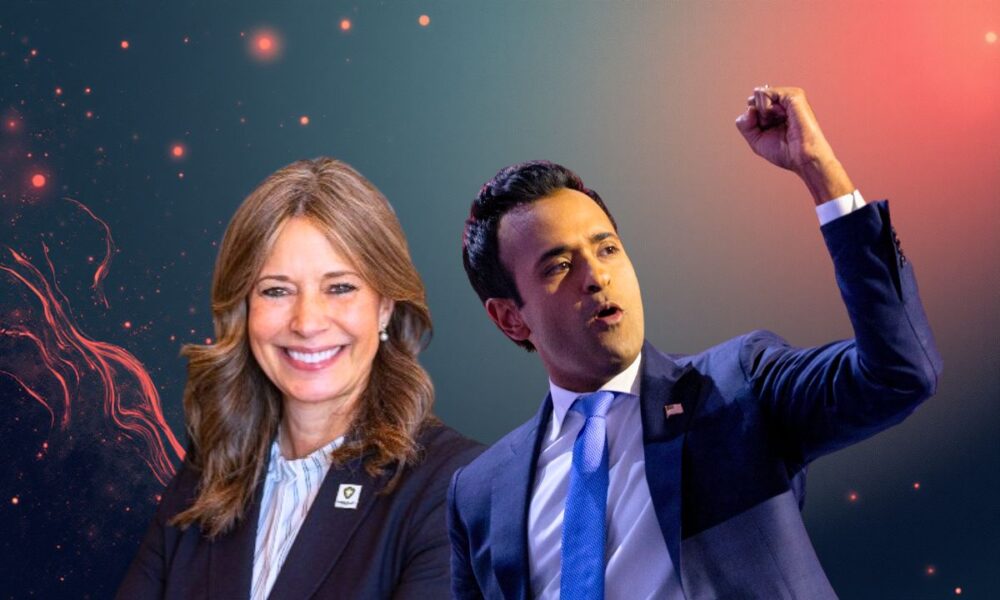Democratic gubernatorial candidate Dr. Amy Acton has sharply criticized Republican rival Vivek Ramaswamy, calling him out for past remarks about Ohioans being “lazy” and “mediocre” and for his support of H-1B visas.
Acton, a former Director of the Ohio Department of Health, framed her attacks around what she describes as Ramaswamy’s disconnect with everyday Ohioans.
In a recent interview, she said, “I’m running against a guy, Vivek Ramaswamy, who has said that people are struggling in Ohio because they’re lazy, they’re mediocre, they’re not working hard enough. And I can absolutely tell you that is not the Ohioans I know or see.… And listen, I’m running for governor because people in my state are struggling. And I refuse to look the other way while these bad actors, special interests, and lobbyists keep taking our state in the wrong direction.”
Acton: I’m running against a guy, Vivek Ramaswamy, who has said that people are struggling in Ohio because they’re lazy, they’re mediocre, they’re not working hard enough. And I can absolutely tell you that is not the Ohioans I know or see. I think he’s completely out of touch.… pic.twitter.com/5fX8wFxsgS
— Acyn (@Acyn) November 15, 2025
Ramaswamy, who has drawn support from President Donald Trump, defended the H-1B visa in a December 2024 social media post.
He argued that the hiring of foreign-born engineers by top tech companies is driven by cultural factors, not an “innate American IQ deficit,” and emphasized that U.S. culture has long venerated mediocrity over excellence.
Ramaswamy wrote, in part, “Our American culture has venerated mediocrity over excellence for way too long (at least since the 90s and likely longer). That doesn’t start in college, it starts YOUNG. A culture that celebrates the prom queen over the math olympiad champ, or the jock over the valedictorian, will not produce the best engineers. A culture that venerates Cory from ‘Boy Meets World,’ or Zach & Slater over Screech in ‘Saved by the Bell,’ or ‘Stefan’ over Steve Urkel in ‘Family Matters,’ will not produce the best engineers.”
He later went on to highlight immigrant parents he claimed to know, whom he said limited their children’s television consumption and “their kids went on to become wildly successful STEM graduates.”
Vivek Ramaswamy told us how he really feels when he said that Ohioans aren't succeeding because they're lazy and mediocre and watching too much TV.
That couldn't be further from what I'm seeing on the ground every day. Ohioans are working harder than ever, they're doing… https://t.co/v4TO0gMuPs
— Dr. Amy Acton (@amyactonoh) November 12, 2025
Acton responded to that post on November 12, 2025, stating, “Ohioans are working harder than ever, they’re doing everything right, and they just can’t get enough breathing room.”
She has repeatedly followed up with other videos and posts that have repeated this line of attack.
Acton’s comments echo concerns raised in previous investigations of Amazon and other major tech companies, where lawmakers questioned why U.S. workers are often displaced in favor of foreign hires under the H-1B visa program.
Ealier this year, Senate Judiciary Committee members, including Democrat Dick Durbin of Illinois and Republican Chuck Grassley of Iowa, sent a letter to Amazon CEO Andy Jassy noting that “with all of the homegrown American talent relegated to the sidelines, we find it hard to believe that Amazon cannot find qualified American tech workers to fill these positions,” according to The Dallas Express.
While Acton’s populist attacks are aimed at Ramaswamy’s record, her own record has faced scrutiny.
During her tenure as Ohio’s health director in the early days of the COVID-19 pandemic, she ordered temporary closures of gyms and other businesses, a decision that critics argue disrupted local economies.
Ramaswamy called out her record in another X post: “No politician has increased poverty in Ohio more than Dr. Lockdown. She lied about Covid death rates to justify sweeping lockdowns that devastated our families & she still lies about it today.”
Neither Acton nor Ramaswamy is officially their party’s nominee; the primary is not until May 2026. However, both candidates are perceived as the frontrunners in their respective races.
The polls indicate a close race in the November 2026 general election, should the contest ultimately pit Ramaswamy against Acton. Some polls show Acton with a lead while others indicate that the race is a dead heat, Newsweek reported.
Once a swing state in presidential elections and other statewide contests, Democrats have not won a statewide race since Sherrod Brown was re-elected to the Senate in 2018.
The rivalry between Acton and Ramaswamy is heating up more than a year before the Ohio gubernatorial election, with both candidates seeking to define themselves on issues ranging from economic policy to public health and workforce development.


